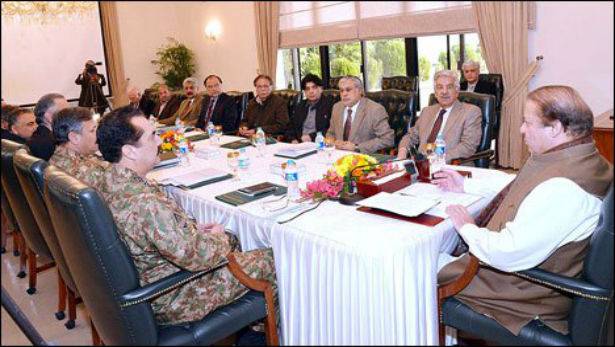LAHORE: Despite the year-long implementation on the national action plan the recent wave of brutal terror attacks in the insurgency-plagued northwest have put a question mark on the execution of the strategy.
Since the beginning of this year there is no respite in terror strikes in the country as militants are targeting security forces, students, and ordinary citizens in gun and bomb attacks. According to official sources, more than 60 people have been killed and over 100 others wounded in the recent terror strikes.
During background interviews with The Nation, senior government officials, security, and counter-terror experts were of the view that “the fight against terrorism will continue and it may take more years.”
They said that the National Action Plan helped the government achieve short-term objectives but more measures are needed to accomplish the long-term targets.
“First, we must understand what’s happening in the world, particularly in Afghanistan, Middle East, and Africa. Several nations are fighting terrorism simultaneously and this fight will continue in the years ahead,” said a former intelligence officer who preferred his name not to be mentioned.
He said that the terror outfits operating in the world are inter-connected therefore, “the states must cooperate with each other to fight militancy aggressively”.
A former Inspector General of Police said the National Action Plan had been drafted to bring the whole nation on one page. “Look, what we have achieved (by implementing the NAP) is that the whole nation is united against terror. People now wanted to get rid of this menace and they are with security forces in the fight against militancy,” said the ex-police chief.
Although authorities arrested thousands of suspects and killed hundreds of them under the National Action Plan yet education is still under attack. Schools are open amid tight security but students are scared across the country.
Wednesday’s terror attack on a leading university in the insurgency plagued Khyber-PK province, suggests the militants still have the capability to strike at their will.
The unanimously-approved National Action Plan, drafted in the wake of Taliban assault on an army-run school in Peshawar in December 2014, is being questioned since terrorists struck the BKU in Charsadda early this week.
A provincial government official while requesting anonymity said the federal and provincial governments would have to take “concrete measures and solid steps” to counter insurgency and militancy.
“The terror attacks could not be controlled fully by implementing any single strategy. We will have to fight on multiple fronts. We have to change the mindset and we need to improve our intelligence collection mechanism,” the official said.
Another security expert suggested that the counter-terror officials should be provided more resources in the field of technology and logistics to trace and hunt down radicalised elements. There should be experts and professionals to pinpoint dangerous elements hiding in our society, he said. “We need extensive monitoring of suspected elements, their financers, and supporters. The security institutions should penetrate into the network of militant outfits to thwart their plans by getting prior information,” he said.
Following is summary of the key points of the NAP along with a review of actions taken so far.
More than 300 condemned prisoners including terrorists and hardcore criminals have been hanged in jails across the country since Pakistan lifted a moratorium on death penalty. Also hundreds of militants and criminals were killed in police raids or security operations across the country.
The strengthening and activation of NACTA was part of the NAP but the Federal government failed to fully activate the much-needed National Counter Terrorism Authority which was supposed to be fully functional by now.
More than 10,000 cases were registered and over 6,000 people were arrested over hate-speech or violating other laws introduced as parts of the NAP.
The government has successfully identified the religious schools getting financial support from other countries. But authorities are unable to stop the militants financing because of complicated nature and ways of money transfers.
The Punjab, Sindh, and Balochistan provinces, to some extent, have raised a force of counter terror corporals which was pledged under the National Action Plan.
The registration of religious schools is underway in the country but the government is unable to regulate the education system in all madrassas as it was promised as part of the NAP.
Authorities are unable to dismantle the communication networks of terrorist organisations as many banned outfits including sectarian organisations are running their propaganda campaigns by using social media tools.
Security forces are struggling to maintain peace in the port city and a massive operation is underway there against militants and criminals.
Thousands of Afghan nationals, staying illegally in Pakistan, are frequently detained and released by the law-enforcement agencies. But the government has failed to complete the registration process of all Afghan refugees.
Friday, April 19, 2024
Terror wave puts question mark on NAP execution

Desilting of Nallah Bhed starts
April 19, 2024
Israeli missiles hit site in Iran: reports
8:09 AM | April 19, 2024
Parvez Elahi’s indictment delayed again in two cases
April 19, 2024
SC suspends ECP’s re-polling order in PP-51
April 19, 2024
A Tense Neighbourhood
April 19, 2024
Dubai Underwater
April 19, 2024
X Debate Continues
April 19, 2024
Hepatitis Challenge
April 18, 2024
IMF Predictions
April 18, 2024
Kite tragedy
April 19, 2024
Discipline dilemma
April 19, 2024
Urgent plea
April 19, 2024
Justice denied
April 18, 2024
AI dilemmas unveiled
April 18, 2024
ePaper - Nawaiwaqt
Advertisement
Nawaiwaqt Group | Copyright © 2024





